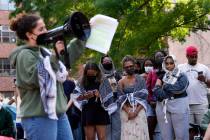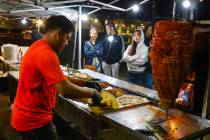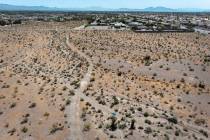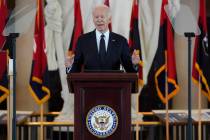Macau gamble pays off but draws law enforcement scrutiny
In a few short years, Macau has become the world's greatest casino profit center and the envy of much of the gaming industry.
With all of economically booming China as its backyard, Macau has a seemingly inexhaustible customer base. And its top Nevada-based casino kings, Sheldon Adelson of Las Vegas Sands and Steve Wynn of Wynn Resorts, are being richly rewarded for the risks they assumed when they raced to be licensed in the treacherous place whose smoky casinos were reputed to be riddled with Triad influence.
Adelson and Wynn aren't shrinking violets. They're tough businessmen with long track records of success.
But these days I have to wonder if even they fully appreciated the complexities of doing business in that historical smuggler's paradise.
For Adelson, the game is made more challenging by recent news that the Securities and Exchange Commission and Department of Justice are seeking documents pertaining to possible violations of the U.S. Foreign Corrupt Practices Act, which makes it illegal for American companies to bribe foreign officials. Nevada's Gaming Control Board is monitoring developments, and Reuters has reported the FBI also is investigating.
The SEC and Department of Justice investigations come in the wake of a breach of contract lawsuit filed in Clark County District Court by attorneys for former Sands China chief executive Steve Jacobs, who alleges a company subsidiary transferred millions from Macau to Nevada. The Jacobs lawsuit and published reports have raised the issue of Triad influence inside Macau casino VIP gambling rooms.
Jacobs also claims Adelson instructed him to "threaten to withhold Sands China business from prominent Chinese banks unless they agreed to use influence with newly elected senior government officials of Macau in order to ... obtain favorable treatment with regards to labor quotas and table limits."
A Las Vegas Sands spokesman said company officials continue to "adamantly deny the allegations in the Jacobs lawsuit." The spokesman also recently called the SEC investigation a "nonpublic, fact-finding inquiry."
But Macau's long connection to Triad hoodlums and casino junket masters and moneylenders is no secret. Macau is considered one of the world's drug and money laundering flashpoints by the U.S. State Department, which placed it on a list of "Countries/Jurisdictions of Primary Concern."
A motion to dismiss is scheduled for Tuesday morning in the Jacobs lawsuit, and Las Vegas Sands has blamed much of the recent government scrutiny on the litigation's incendiary allegations. (The company has sued Jacobs for criminal defamation in Macau.)
The litigation's relative merits aside, the idea the State Department, Department of Justice, SEC, FBI, and Gaming Control Board might somehow be focused on Macau casino activity because of one lawsuit in Las Vegas is ludicrous in the extreme.
In its 2011 International Narcotics Control Strategy Report released earlier this month, the State Department noted that, while Macau wasn't "a significant regional financial center" in the traditional sense, "as the world's biggest gambling market by revenue, benefiting from millions of visitors -- mostly from nearby mainland China -- Macau is vulnerable to becoming a hub for the laundering of criminal proceeds. Reported annual gaming revenues for 2010 were over $23.5 billion, although observers note that the amount of unreported illegal side-betting could be as much as ten times reported revenues."
As much as 10 times reported revenues?
According to the State Department, the dangers of under-regulated casino gaming in Macau are clear and present.
The casinos' nearness to China, a lack of gaming regulation and control of cross-border money movement increase the risk of "money laundering and terrorist financing activities," the report states. "The primary sources of criminal proceeds in Macau are drug-related crimes, organized crime, and illegal gambling."
A trouble spot: " loosely-regulated gaming promoters, known as junket operators, profit from sourcing the majority of Macau's VIP players who contribute to over 80 percent of gaming revenues."
They're described as in-house moneylenders and credit agents who supply players "to casinos on commission. Junkets are increasingly popular among gamblers seeking anonymity and among casinos aiming to reduce credit default risk."
The State Department report calls that relationship an "inherent conflict of interest" that presents significant challenges to anti-money laundering measures in the gaming sector.
Macau's Triad-tinted junket trouble is reminiscent of the Las Vegas of old, where the rewards were great but the risks sometimes cost casino kings dearly.
Time will tell whether anyone has learned from history.
John L. Smith's column appears Sunday, Tuesday, Wednesday and Friday. E-mail him at Smith@reviewjournal.com or call (702) 383-0295. He also blogs at lvrj.com/blogs/smith.























